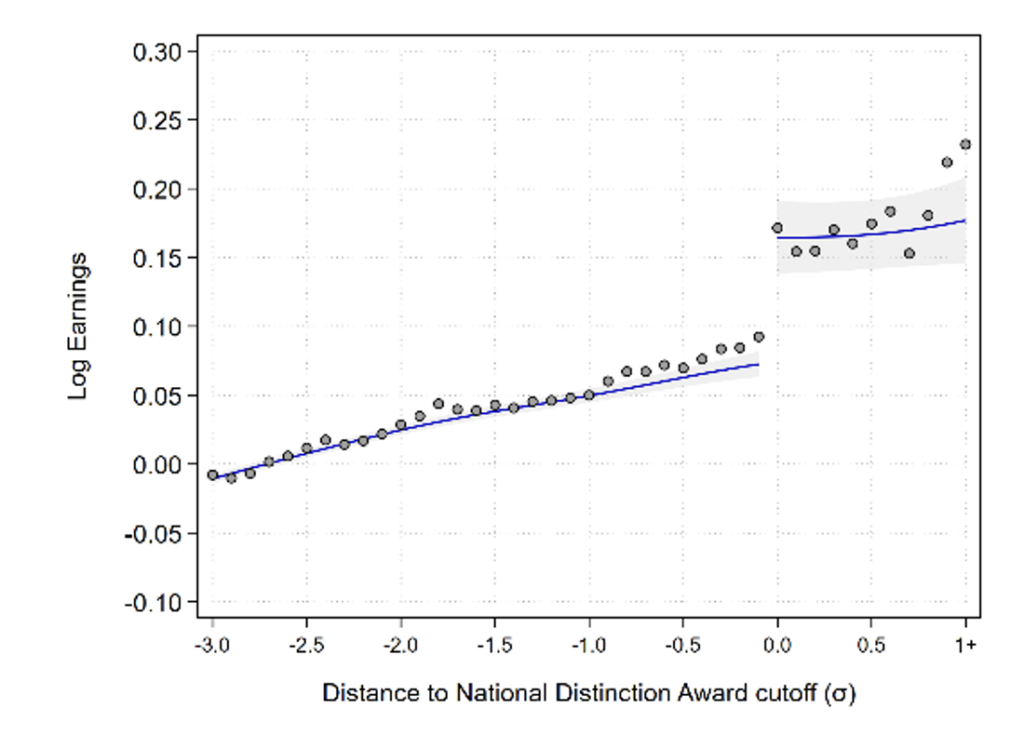
A degree from an elite university—like good grades and honors degrees—often serves as a signal of superior talent, a beacon that guides employers through a sea of candidates to the allegedly most desirable hire. Such bias in favor of the elite, however, can disadvantage highly skilled and talented people who attend less renowned schools or groups like migrants, who often navigate the job market with fewer recognizable signals of their abilities and potential. It can also cause employers to overlook candidates whose skills most closely match the needs of the job they want to fill.
This disparity raises a crucial question: How fair and effective are traditional signals of ability? And to what extent do they serve employers and the productivity of society as a whole?
A Study in Colombia
A recent study in Colombia focusing on the impact of a standardized exam and an accompanying national award to high scorers sheds light on this very issue. It demonstrates that even in a labor market brimming with signals, standardized evaluations and awards can be powerful tools. They can level the playing field for those who might otherwise be overlooked and help employers match candidates to their desired skills profile.
Traditionally, Colombia’s job market, like many others, has been influenced heavily by the reputation of educational institutions. Graduates from elite colleges often have a head start, irrespective of their actual skills or potential. However, the National Distinction Award is changing that narrative. The award, begun in 2003, is given on the basis of a standardized exam towards the end of college that evaluates not only core competencies in areas like reading comprehension and English proficiency, but also skill-specific capacities in the student’s area of concentration, including macroeconomics and microeconomics for economics students and electromagnetism and thermodynamics for students of physics.
Salary Advantages
As my co-authors and I demonstrate, the award’s impact is quantifiable and significant. Recipients enjoy a 7% to 12% salary advantage over their (observationally identical) peers without it. Moreover, this is not just a temporary boost but a sustained elevation in their career trajectory, with advantages in terms of both work experience and an earnings boost lasting at least five years after graduation from college. The award is particularly beneficial for graduates from less prestigious colleges, suggesting its role in bridging the gap created by perceived institutional quality.
Figure 1. Effect of the National Distinction Award (Signal) on Early-Career Earnings

The phenomenon is not just about work experience and higher salaries, however. By signaling to employers a graduate’s specific skills, irrespective of the prestige of their alma mater, it helps to more closely align workers’ expertise with jobs. This leads to greater productivity for the hiring firm and greater efficiency in the labor market as a whole. This reality is rooted in the signaling theory in economics. The award acts as a credible signal to the labor market, indicating that the recipient possesses high-quality skills and knowledge. In a market where employers often struggle to differentiate between candidates from various educational backgrounds, the award thus reduces the information asymmetry between employers and job seekers, allowing firms to make more informed hiring decisions.
Our results highlight the importance of standardized assessments in providing a fair and objective measure of students’ capabilities and challenge the traditional reliance on the reputation of educational institutions. By shifting the focus to individual merit, such assessments take a significant step towards democratizing opportunities in the labor market, ensuring that talent and hard work are rewarded.
The Value of Signaling for Other Types of Hiring
The value of signals in a well-informed market also raises important questions regarding the value of signals for other groups, especially those typically lacking formal or valid diplomas for the local market, like recent migrants. Could, for instance, skill certifications provide them with a more straightforward path to employment opportunities? As the global community continues to address educational and labor market disparities, the insights from this study could offer a valuable model. When workers are provided with tools to signal skills, an opportunity to foster a labor market is generated in which talent and hard work are universally recognized and rewarded, regardless of background or origin.


Leave a Reply